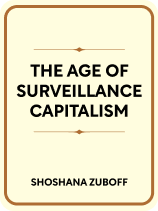

This article is an excerpt from the Shortform book guide to "The Age of Surveillance Capitalism" by Shoshana Zuboff. Shortform has the world's best summaries and analyses of books you should be reading.
Like this article? Sign up for a free trial here.
What is surveillance capitalism? What role did Google play in its creation? What are the consequences?
According to author Shoshana Zuboff’s explanation of surveillance capitalism, Google’s development of targeted advertising and data predictions played a major role in its creation. Zuboff claims that Google now holds a dangerously powerful position in surveillance capitalism and our rights to privacy.
Read on to learn the connection between Google, surveillance capitalism, and advertising, according to Zuboff.
Google Pioneers Surveillance Capitalism
According to author Shoshana Zuboff, Google was the pioneer of surveillance capitalism. By looking at the history of Google, surveillance capitalism’s foundations become clear. Google’s response to the threat of the dot-com bubble, which caused the stock prices of internet companies like Google to fall, gave rise to surveillance capitalism as big tech companies faced a dire financial position.
(Shortform note: While Zuboff details the consequences of the dot-com bubble, she doesn’t explain what it was. In the 1990s, overly optimistic investments in technology companies led to a rapid rise in their stock equity valuations. These stock prices were far higher than the technology companies’ true value, creating a bubble that eventually burst in 2001.)
This bursting of the dot-com bubble prompted several phases in Google’s journey that ultimately led to the creation and expansion of surveillance capitalism. Let’s look at each phase in detail.
Google Starts Using Targeted Advertising
Zuboff explains that from its conception, Google’s founders Larry Page and Sergey Brin had intended for Google to be a free search engine. They refused to charge people for using their service and committed to excluding ads from their site. However, this left them with few opportunities to earn revenue, which made them extremely vulnerable when investors were looking to pull out as a consequence of the dot-com bubble.
To create a consistent source of revenue, Page and Brin finally decided to surrender to the idea of adding advertisements to their site—this was the first phase in Google’s surveillance capitalism. They used the data they had collected from searches to match advertisements to specific users, making the ads more relevant and therefore more valuable to advertisers.
(Shortform note: Page and Brin were forced to compromise their vision for an ad-free site to please investors, which business experts say is a common problem. In fact, some experts recommend that start-ups forgo venture capital funding altogether to avoid this exact predicament. They claim that the less external funding that start-ups raise, the more successful they are.)
| The History of Targeted Advertising Although targeted advertising became the solution to Page and Brin’s revenue issue, they were far from the first to implement it. Advertisers began targeting certain demographics as early as the mid-90s, when they realized they could reach certain groups of consumers depending on where they placed their ads on websites. In the years to follow, targeted advertising became increasingly advanced with new tracking tools, strengthening the position of surveillance capitalism. By the time Google entered the scene, sponsored search—which gave advertisers the chance to bid for top search engine results related to particular terms—was already a popular advertising model. |
Google Discovers the Potential of Predictions
Then, Zuboff says, in the early 2000s, a seemingly insignificant event caught Google’s attention. It noticed a large spike in searches across different time zones for Carol Brady’s (a popular character from the American sitcom The Brady Bunch) maiden name after it aired as a question on Who Wants to Be a Millionaire? In other words, the increase in searches corresponded to a precise and predictable pattern that Google’s analysts could see within their data.
The Carol Brady incident made Google realize that they could use their search data to identify events and trends before the news media and predict with precision what users were looking for. With these predictions, they could then target users with more relevant advertisements. Zuboff argues that this marked the beginning of surveillance capitalism because Google recognized the value and power of its behavioral data for the first time.
| Google Was Not the First Organization to Use TV for Mass Predictions While it may have been a breakthrough moment for Google, the Carol Brady incident was not the first time that a company has been able to predict people’s behavior in connection with televised events. Over a decade before the Carol Brady incident, the UK’s National Grid had successfully forecasted electricity needs based on major televised events they predicted would cause energy surges. How do these events relate to energy surges? In the same way that the Carol Brady question on Who Wants to Be a Millionaire? caused a surge in search queries, certain popular televised events—major soccer games, royal weddings, or even highly anticipated episodes from popular TV shows—cause energy surges when UK households collectively go to the kitchen and make a cup of tea during commercial breaks. The largest energy surge to date occurred during the 1990 World Cup Semi Final, after England missed a penalty against West Germany. |
Google’s Surveillance Expands
To illustrate the progression of surveillance capitalism, Zuboff explains that Google progressed from collecting data from only its search pages to extracting it from sites across the internet to improve its predictions and sell them to advertisers at a higher value. Once other tech companies (and eventually, non-tech companies) realized how profitable Google’s model was, they followed suit by finding ways to extract their own behavioral data. As an example, Zuboff cites Microsoft, which launched a personal assistant called Cortana to capture users’ personal information. Cortana encourages users to share as much of their data as possible to improve its functionality.
(Shortform note: Zuboff uses Microsoft’s Cortana as an example of how other companies have created their own data extraction tools. But just how concerned should users be about Microsoft’s collection of their personal information? A privacy report conducted by Common Sense Media gave Cortana an overall privacy rating of just 71%—a poor score in the context of online privacy. The report also rated Cortana as particularly poor at preventing the sale of data, prohibiting the exploitation of users’ decision-making process, and following student data privacy laws.)
Now, companies are continuously inventing new technologies capable of extracting more specific personal information from users, such as wearable technologies that capture people’s biometric data, surroundings, and even emotions.
(Shortform note: In addition to the wearable technologies that Zuboff mentions, researchers are now developing ways to implant consumer-driven monitors inside of our bodies that could extract specific medical data. These implants would be able to do things like screen patients before appointments or even monitor glucose levels by pairing with a mobile app.)

———End of Preview———
Like what you just read? Read the rest of the world's best book summary and analysis of Shoshana Zuboff's "The Age of Surveillance Capitalism" at Shortform.
Here's what you'll find in our full The Age of Surveillance Capitalism summary:
- The methods big tech companies are using to watch you
- How surveillance capitalism can thrive despite opposition
- How to prevent it from destroying our freedom and democracy






